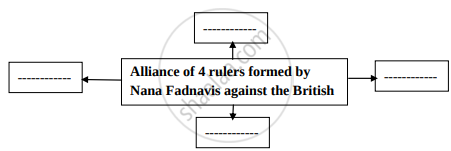Advertisements
Advertisements
Question
Write a note on the Maratha – British relations.
Maratha rulers in various times and British relations
Solution
Maratha rulers in various times and British relations:
Chhatrapati Shivaji Maharaj had foreseen the ulterior motives of these foreigners and their ways of infiltration. He built up strategies to arrest their advances in India. The immediate measures taken by him in this direction included the creation of a strong naval force and the construction of sea forts. He levied octroi on the British salt trade as a measure to protect the local salt trade. Thus, Chhatrapati Shivaji Maharaj adopted a very strong policy against the European colonizers.
The political relations between Chhatrapati Shivaji Maharaj and the British began due to the Afzal Khan episode. Prior to the meeting between Maharaj and Afzal Khan, Dabhol was conquered by the Maratha army. At that time there were three ships of Afzal Khan unloading in the Dabhol port. On receiving the report of Afzal Khan’s death, Mahamud Sharif, his representative in Dabhol, took hold of the ships along with the wealth and goods on it and fled to Rajapur. Fazal Khan, Afzal Khan’s son, asked Abdul Karim, the Subhedar of Rajapur, to unload the ships at Rajapur. The Marathas took advantage of this opportunity to attack Rajapur and conquered it. Now, Abdul Karim who had taken a loan from the British was unable to repay it. Hence, the British seized one out of the three ships, which were in Abdul Karim’s charge. Of course, this was unacceptable to the Marathas and they asked the British to return the ship. The British refused to do so. Hence, the Marathas detained Velaji, the local agent of the British at Jaitapur. Phillip Gifford, a British officer, visited the Maratha camp to request Velaji’s release but he was also detained there. Later, both of them were released. However, this instance strained Maratha-British relations.
In the times after Chhatrapati Shahu Maharaj, Nanasaheb Peshwa took charge of administration. The British could ensure their entry into the political affairs of the Marathas as Nanasaheb, on one occasion, sought help from the British. Nanasaheb was succeeded by his second son Madhavrao Peshwa. However Nanasaheb’s younger brother, Raghunathrao wanted to become the Peshwa. Raghunathrao alias Raghoba approached the British for help. It resulted in appointing a British envoy in the Peshwa court, in Pune. In 1765, the British took over the fort at Malvan. After the death of Madhavrao Peshwa, his younger brother Narayanrao became Peshwa. In his reign, the British tried to conquer Thane, Vasai, Vijaydurg, and Ratnagiri.
For the British to bring the region from Sashti-Vasai to Konkan under their sway was a priority for trading operations. So, they were already planning and moving in that direction. Raghunathrao Peshwa was offered asylum by the British. The British army marched from Mumbai to Pune with Raghunathrao Peshwa in their escort. The British army and the Maratha army met at Talegaon-Wadgaon near Pune and had combat between them. The British army (and of course, Raghunathrao also) was defeated by the Marathas. A treaty was signed, which is known as the ‘Wadgaon treaty’. Later, Nana Phadnavis formed an alliance of four rulers, namely, Peshwa, Bhosale of Nagpur, Nizam, and Hyder. However, the British successfully persuaded the Nizam to break the alliance. All through these happenings the British Governor Warren Hastings had realized that if the British had to establish their permanent rule in India, it was crucial to subdue the Marathas. In the battle of Kharda (Taluka Jamkhed, District Ahmednagar) the Maratha army had a sweeping victory over the Nizam. The British envoy who was present observed and study the military tactics of the Marathas. Later, with the help of this envoy Lord Wellesley could defeat the Marathas.
Nana Phadnavis died during the time of Bajirao Peshwa II. The relations between Holkar and Bajirao Peshwa II had turned bitter. As a result, Yashwantrao Holkar attacked Pune. Bajirao Peshwa II panicked and sought asylum from the British. The treaty signed by the British and Peshwa after this instance is known as the ‘Treaty of Vasai’. However, this treaty was not acceptable to Shinde and Holkar. Hence, there was another Anglo-Maratha War in 1803. The Marathas were defeated in this war. The Third Anglo-Maratha War was fought in 1817. The Marathas were again defeated and the Maratha rule came to an end in 1818. Bajirao Peshwa was granted an annual pension by the British and he spent the rest of his life in Bithoor, near Kanpur
APPEARS IN
RELATED QUESTIONS
The political relations between Chhatrapati Shivaji Maharaj and the British began due to the ______ episode.
Write the name of a historical place/ person/event:
The Marathas defeated this power in the battle of Kharda in 1795 - ______
Complete the concept map.

Complete the following Time Line –

State your Opinion.
In a way, the British captured India from the Marathas.
Why did the Maratha power decline?
Write a note on the Maratha – British relations
British policies
Observe the map and answer the questions based on it.

- Where did the French establish their colonies on the East Coast of India?
- Which power ruled the State of Nagpur?
- Where did the British establish their factory along the western coast of India?
- Who established a colony on the western coast at Goa in India?
- Who ruled the State of Gwalior?
Write information on Anglo-Maratha War:
First Anglo-Maratha War
Write information on Anglo-Maratha War:
Second Anglo-Maratha War
